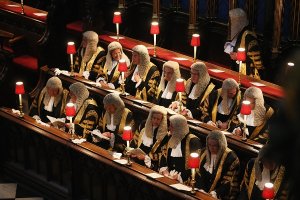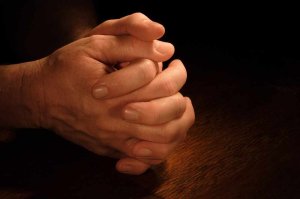We don't think religious worship should play any part in the formal business of the state.
We want to see parliamentary and local government meetings conducted in a manner equally welcoming to all attendees, whatever their personal beliefs.
Parliamentary prayers
Sittings in both the House of Commons and the House of Lords begin with Anglican prayers. MPs and peers stand for prayers facing the wall behind them – a practice thought to have developed due to the difficulty members would historically have faced of kneeling to pray while wearing a sword.
When the chamber is at its busiest, parliamentary prayers act as a bizarre and antiquated seat reservation system. Even MPs and peers who are slated to speak have no option but to attend prayers in order to reserve a seat.
Whilst they may be viewed by some as an important tradition, parliamentary prayers serve to assert the superiority of Christianity (and the Church of England in particular) at Westminster. This 'tradition' is inimical to a modern, pluralistic, secular democracy.
In the Scottish Parliament, Tuesday afternoon sessions begin with 'Time for Reflection', with faith and belief representatives invited to addresses members for up to four minutes. The Northern Ireland Assembly begins formal business with a period of two minutes of silent prayer or contemplation. The Welsh Assembly has adopted no such rituals.
Parliamentarians who wish to pray are free to do so. But prayers should not form part of the official business of Parliament.
Council prayers
Many local authorities in Britain also begin their meetings with prayer.
Local democracy should be equally welcoming to all sections of society, regardless of their religion or belief. Council meetings should be conducted without anyone feeling excluded, or compelled to either participate in prayers or absent themselves from part of the meeting.
Council prayers open the door to wholly unnecessary conflict and sectarian squabbles within local authorities. There is a history of local councillors being bullied and marginalised for challenging council prayers.
The absence of prayers from the formal business of meetings in no way impedes religious freedoms or denies anybody the right to pray. Conversely, organised worship in secular settings imposes worship on those who do not share the faith. A genuine commitment to freedom of religion or belief is incompatible with including acts of worship in the formal business of council meetings.
If local authorities wish to hold a moment of silent reflection at the beginning of a meeting, or if councillors wish to meet for prayers prior to the meeting, they are at liberty to do so.
Take action!
1. Write to your MP
Please enter your postcode and urge your MP to support an alternative to parliamentary prayers, to make parliament more welcoming to people of all faiths and none.
2. Share your story
Tell us why you support this campaign, and how you are personally affected by the issue. You can also let us know if you would like assistance with a particular issue - for example, if you would like to challenge prayers at your own council.
3. Join the National Secular Society
Become a member of the National Secular Society today! Together, we can separate religion and state for greater freedom and fairness.
Latest updates
NSS reiterates call for end of Anglican judges’ service
Posted: Tue, 2 Oct 2018 12:21
The National Secular Society has written to the justice secretary to reiterate its call for the end of the Anglican judges' services which mark the beginning of the legal year.
The main service, which took place at Westminster Abbey on Monday, sees senior legal figures pray for guidance at a service conducted according to the rites of the Church of England.
Attendees include the justice secretary (attending as lord chancellor), the lord chief justice and justices of the Supreme Court. Judges attend the service fully robed, in their official capacity and during working hours.
A similar service at York Minster features a procession involving high court judges, circuit judges, tribunal judges, district judges, queen's counsel and other members of the bar attending in robes.
NSS chief executive Stephen Evans told David Gauke the services raise "serious issues about the neutrality and independence – or at the very least the perceived neutrality and independence – of the judiciary".
"It cannot be appropriate in an increasingly pluralistic society for the judiciary to associate itself with, or appear to favour, one particular religious tradition or set of beliefs.
"Judges' services entrench the view that Christianity demands particular respect and exceptionalises it in a way that undermines the impartiality of the judiciary. It cannot be in the interests of justice that these services continue and we ask that you initiate their ending."
The NSS said the services undermine judicial neutrality on contentious issues such as assisted dying, abortion, civil partnerships, free speech, divorce and gender recognition. The Church of England has taken a public position on all of these.
The NSS wrote that "the time must be right to insist on a clear separation between the judiciary and the established church" in light of revelations about the C of E's cover-ups of child abuse. In July the Independent Inquiry into Child Sexual Abuse heard that judges were among powerful figures who helped the bishop and convicted sex offender Peter Ball evade justice for decades.
Mr Evans added that the services are "an unnecessary burden on the taxpayer". Last year the Ministry of Justice refused to respond to an NSS freedom of information request on the cost of the services to the public purse.
Explaining the decision to write the letter, Mr Evans said: "The state endows judges with enormous responsibility to make decisions which have an impact on the lives of all British citizens.
"In return the state should expect judges to wield their power without fear or favour, including when judging on the conduct of individuals involved in the Church of England or making decisions which may displease its leaders. The Anglican judges' service undermines that.
"The service also entrenches deference to the Anglican faith and religion in public life more generally. And it's particularly unedifying to see it go ahead after the series of recent revelations about the Church of England's appalling handling of child abuse allegations."
The NSS wrote to Gauke's predecessor, David Lidington, to call for the services to be scrapped last year. Lidington, a Christian MP who opposed gay marriage and has advocated for a greater role for religion in public life, did not respond.
Judges' services date back to the Middle Ages, when the High Court was held in Westminster Hall and judges prayed for guidance at the beginning of the legal term.
The NSS's position has previously gained support from legal commentator Joshua Rozenberg. In 2013 Rozenberg wrote: "It is not very edifying to see independent judges taking part in religious rites which are, at best, meaningless to them and, at worst, offensive to their actual beliefs".
The NSS has called on the new justice secretary to consider an alternative to the judges' service that marks the opening of the legal year in a solemn and engaging but secular and inclusive way. The Westminster Abbey service is followed by a breakfast hosted by the lord chancellor, which the NSS did not object to.
NSS writes to Welsh town council over prayers just before meetings
Posted: Wed, 8 Aug 2018 15:30
The National Secular Society has asked the mayor of a south Wales town to ensure prayers are "sufficiently separate" from council meetings and "entirely optional".
The NSS has written to Janice Charles, the Conservative mayor of Barry, after she announced plans to hold prayers five minutes before meetings begin in the council chamber from 1 October.
NSS chief executive Stephen Evans asked her to "ensure that meetings are conducted in a manner equally welcoming to all attendees, regardless of their individual religious beliefs or lack of belief."
"Religious worship should therefore play no part in the formal business of council meetings.
"It is also reasonable for attendees to expect the chamber to be available for a fair interval before the meeting where the chamber is available so they can meet their colleagues, take their seats and prepare. If prayers begin in the chamber five minutes before the meeting starts, any councillor who does not wish to pray will be unable to do this."
Commenting on the decision to send the letter, Mr Evans added that council meetings "should be inclusive and neutral regarding religion".
"Local councils aren't clubs for Christians and Cllr Charles shouldn't seek to use her position to impose her own religious beliefs and practices on others.
"Councillors who wish to pray can do so away from the council chamber in advance of the meeting beginning. That way, prayers will in no way alienate or disadvantage other councillors who may wish to arrive early to the meeting but do not wish to take part in acts of worship."
The leader of the council's opposition, Plaid Cymru councillor Shirley Hodges, said prayer had been "imposed by one individual".
"There has been guidance from the clerk that we cannot discuss it.
"Introducing prayers is the wrong message. It splits up the town, is not inclusive and does not encourage people to get involved in politics.
"This is baggage we don't need. Let's carry on in our secular world."
In 2012 the High Court ruled that prayers should not be said as part of formal council business after the NSS initiated a judicial review on the subject. The ruling initially applied to the formal meetings of all councils in England and Wales.
The ruling remains valid in Wales, except in a few cross-border authorities. In 2015 the government changed the law in England to make prayers, "other religious observance" or "observance connected with a religious or philosophical belief" lawful at local authority meetings.
Last year research from the BBC found that 18 of the 22 unitary authorities in Wales did not hold prayers as part of council business.
In response to the criticism Cllr Charles has accused the NSS and her political opponents of "playing politics" and being "mean spirited".




